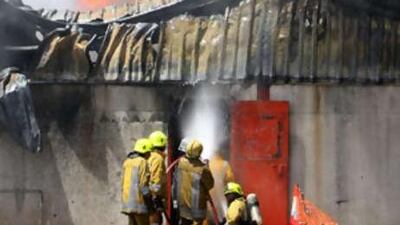DUBAI // A spate of devastating fires and road accidents this year has prompted Dubai Police to seek more tactical training to improve the force's response to large-scale emergencies. The Dubai Police Rescue team is undergoing training on dealing with major accidents such as the recent fire in Al Quoz which ripped through 80 warehouses, killing two people and causing Dh1 billion (US$272,000 million) of damage, and the road accident which involved hundreds of cars on the Abu Dhabi-Dubai motorway in March.
The police have admitted that the Al Quoz rescue operation was hampered, in part, by confusion resulting from a lack of communication between the agencies involved. The new training is focusing on how to establish a clear chain of command and dealing with hazards involving high-rise buildings, as well as incidents involving many people and multiple casualties. Sean Johnson, a US rescue instructor and fireman, has been training firemen to avoid communication breakdowns by implementing a clearly defined leadership structure at the scene of an emergency. He also warned the team about the perils they would face in the event of a fire at one of the many skyscrapers under construction in Dubai.
A Dubai police spokesman admitted that a lack of communication between agencies had led to confusion during rescue attempts at the Al Quoz warehouse fire. "There is always one leader for every accident, big and small, who is easily identifiable because he wears a different coloured helmet," he said. "But in the case of larger-scale accidents like the fire at Al Quoz there was some confusion among the different agencies with communication, but we all worked together and solved the problem.
"We are always looking for training and outside expertise to help us as Dubai grows, so there are plans in place for every scenario." The training exercises, which began last month, were helping the squad to recognise hidden dangers and take appropriate action, he said. "It helped the team to realise the dangers associated with entering a burning building when they are looking for people alongside the Civil Defence.
"They are already well trained in these procedures but they are always undergoing training in all areas including fires." Mr Johnson told the team its priority should always be to remove people from the scene of an accident before looking for trapped bodies. "Fires in high-rise towers are exceptionally dangerous for search-and-rescue teams because of the way they are constructed," he said. Dubai Police Rescue is called out to all large-scale emergencies in the emirate, particularly fires, where they work alongside Dubai Civil Defence, helping to locate people who may be trapped or injured in a burning building.
The fire at Al Quoz, which killed two, destroyed more than 80 warehouses and covered the city in a thick haze of acrid smoke, was triggered by an explosion in an illegal fireworks warehouse. The blast caused what police described as the emirate's biggest fire and left dozens of workers injured. Businesses surrounding the warehouse on the Al Quoz industrial estate sustained damage estimated at Dh1 billion (US$272 million).
In April a fierce blaze destroyed one of Dubai's oldest and most popular markets, devastating shopkeepers, ruining livelihoods and injuring firemen on a day branded "Black Wednesday". The entire Naif Souq was reduced to ashes in the early morning fire. Dubai Police Rescue worked alongside their colleagues in the Abu Dhabi division on March 11 when a 200-car pileup on the motorway between Abu Dhabi and Dubai killed four motorists and left dozens more injured.
These and similar accidents are part of the reason the police force is re-examining the tactical approach to its rescue operations. The fact the emirate is in the midst of a construction boom, with tens of thousands of labourers working on half-built skyscrapers, makes it even more important that rescue teams are fully prepared. Mr Johnson said the Dubai Police Rescue team was generally well equipped to handle such emergencies: "They have all the best toys and equipment and it is really impressive. They have more than we have in California."
Mr Johnson used the 1995 Oklahoma bombing and the September 11 attacks in New York as examples to illustrate how a multi-agency search-and-rescue operation could be hampered by the absence of a clear plan and leadership structure. He told the team it was vital to have in place a system under which everyone involved in an operation answered to just one leader as this would eliminate the confusion which could easily set in when trying to rescue survivors from burning skyscrapers.
"The problem arises when there is a large amount of people all helping but there is complete confusion," said Mr Johnson. "There needs to be one man in charge of the operation and then box off four different geographical zones with a chief in each one. They only answer to the chief in charge." @Email:eharnan@thenational.ae

